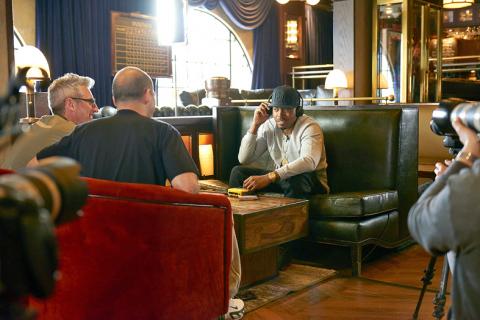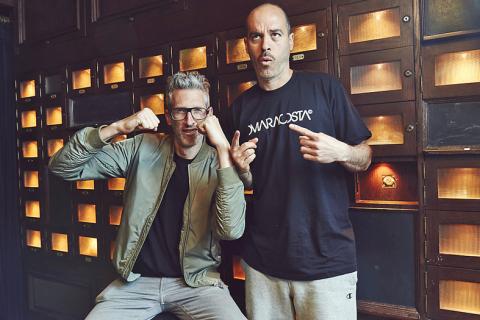In hip-hop, the first half of the 1990s is known as a golden era, and for good reason. This is the time that hip-hop stalwarts like the Wu-Tang Clan, Nas, Jay Z, Fat Joe, Busta Rhymes and more all began their illustrious careers, and all of whom appeared on the Stretch Armstrong and Bobbito Show before they had record deals. The documentary Stretch and Bobbito: Radio that Changed Lives will be shown tomorrow as part of the Urban Nomad Film Fest.
HUMBLE BEGINNINGS
The Stretch Armstrong and Bobbito Show was a college radio show located on a hard place to find at the very end of the dial at 89.9. The show was as real as keeping it real got because it was in a dank basement with equipment from the 1960s. Hip-hop was still fairly new then, so Stretch and Bobbito were given the graveyard shift of Thursday nights from 1am to 5am. For most people, this would be a deathblow, but for Stretch and Bobbito, it only added to the legend because people had to stay up to hear the rap-a-palooza.

Photo courtesy of Matt McGinley
Each show featured new music as well as artists coming in for interviews in the studio and freestyling for as long as they could ride the beats. This show became so influential that artists would get signed to record deals just on the strength of their live freestyles, which happened to Ol’ Dirty Bastid from the Wu-Tang Clan.
“We never knew who would be huge, that’s what made listening to the show compelling,” Bobbito Garcia told the Taipei Times in an e-mail interview. “You just never knew!”
TAPES, TAPES, TAPES

Photo courtesy of Bobbito Garcia
“The ‘90s was an incredible era of music and me and Stretch were right there to help push it forward,” Garcia said.
The radio hosts realized that their show was becoming influential when tapes of it started popping up all around the globe. Rapper Busta Rhymes in the documentary explained to them in an interview that he didn’t want to deal drugs in high school, so he was bootlegging their tapes to make money before he was a high profile rapper.
When making the documentary on himself and Stretch Armstrong, Garcia was surprised to learn a lot of things, especially how they became star makers.
“The most mind blowing thing was when we did research on statistics. We featured 300 unsigned artists on our show in eight years back in the ‘90s. Since then, they’ve collectively sold in excess of 300 million records,” Garcia said.
LOSING MONEY, GAINING IMMORTALITY
Like all good things, Stretch and Bobbito’s partnership came to an end in the late 1990s. There was even a time when they didn’t talk to each other. Eventually, though, the dynamic duo reformed and did a 20th anniversary show from the same basement they made history from.
Towards the end of the documentary, Stretch and Bobbito are talking with Fat Joe, and tell him that they actually lost money over the period they did the show.
“Naw, what you two did was priceless,” Fat Joe said.

Taiwan Power Co (Taipower, 台電) and the New Taipei City Government in May last year agreed to allow the activation of a spent fuel storage facility for the Jinshan Nuclear Power Plant in Shihmen District (石門). The deal ended eleven years of legal wrangling. According to the Taipower announcement, the city government engaged in repeated delays, failing to approve water and soil conservation plans. Taipower said at the time that plans for another dry storage facility for the Guosheng Nuclear Power Plant in New Taipei City’s Wanli District (萬里) remained stuck in legal limbo. Later that year an agreement was reached

What does the Taiwan People’s Party (TPP) in the Huang Kuo-chang (黃國昌) era stand for? What sets it apart from their allies, the Chinese Nationalist Party (KMT)? With some shifts in tone and emphasis, the KMT’s stances have not changed significantly since the late 2000s and the era of former president Ma Ying-jeou (馬英九). The Democratic Progressive Party’s (DPP) current platform formed in the mid-2010s under the guidance of Tsai Ing-wen (蔡英文), and current President William Lai (賴清德) campaigned on continuity. Though their ideological stances may be a bit stale, they have the advantage of being broadly understood by the voters.

In a high-rise office building in Taipei’s government district, the primary agency for maintaining links to Thailand’s 108 Yunnan villages — which are home to a population of around 200,000 descendants of the Chinese Nationalist Party (KMT) armies stranded in Thailand following the Chinese Civil War — is the Overseas Community Affairs Council (OCAC). Established in China in 1926, the OCAC was born of a mandate to support Chinese education, culture and economic development in far flung Chinese diaspora communities, which, especially in southeast Asia, had underwritten the military insurgencies against the Qing Dynasty that led to the founding of

It’s fairly well established that strength training is helpful at every age: as well as building muscle, it strengthens tendons and ligaments, increases bone density and seems to have protective effects against everything from osteoporosis to dementia. But a new study based on data collected over two decades in Rio de Janeiro, Brazil, suggests that another physical attribute might be just as important — and it’s one that declines even faster than strength as the years go by. The good news? It might also be less uncomfortable, and even slightly safer, to improve. Also, it will probably make you better